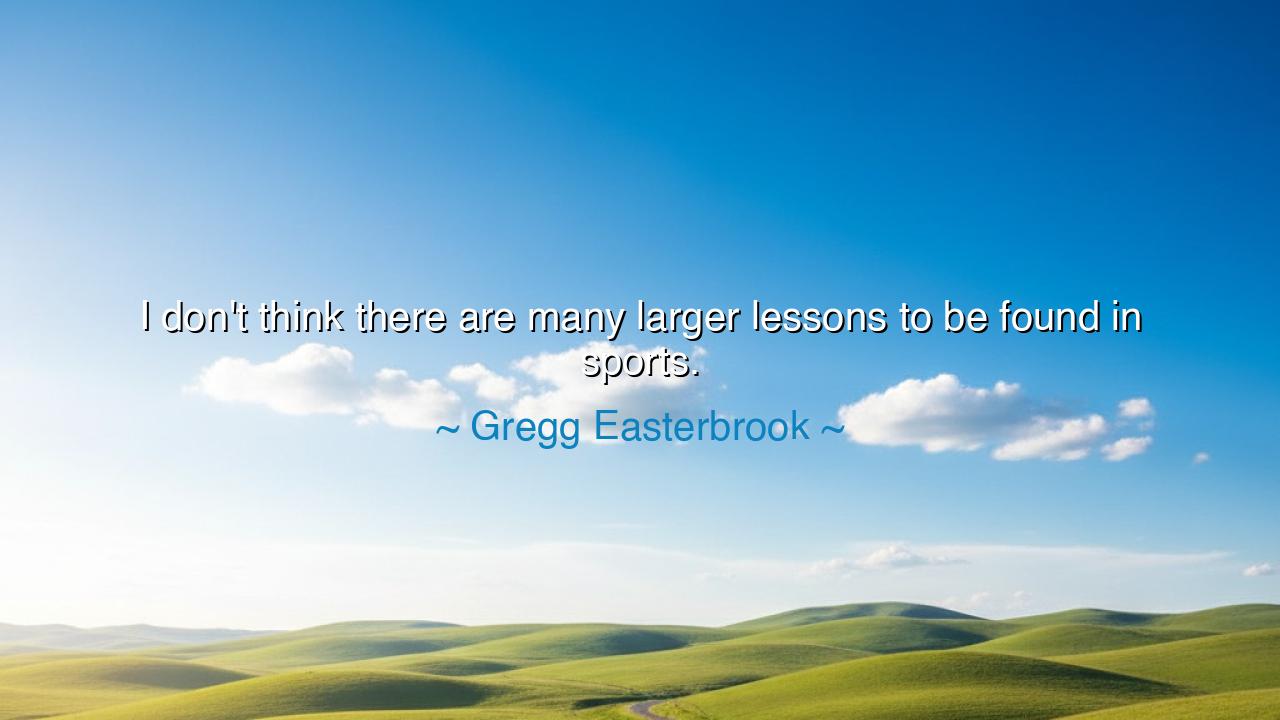
I don't think there are many larger lessons to be found in






Listen well, O seekers of wisdom, and heed the words of Gregg Easterbrook, who spoke plainly yet profoundly: “I don’t think there are many larger lessons to be found in sports.” At first, these words may seem to diminish the grandeur of competition, to strip away the heroic narratives we often attach to the victories and defeats on the fields and courts of the world. Yet, in their simplicity lies a powerful recognition: that sports, in their essence, are but games—mirrors of life’s fleeting moments, not the grand repositories of universal truth. They are entertainment, challenge, and camaraderie, not scripture or philosophy, though they may appear so in the eyes of the eager or the ambitious.
Consider the history of great athletes. The legend of Jim Thorpe, the Native American who triumphed in the 1912 Olympics, inspires awe and admiration. Yet, Easterbrook’s words remind us that his feats, as heroic as they were, do not alone contain the sum of human virtue. The lessons of courage and perseverance, while visible on the track, are not exclusive to the arena of sport. Thorpe’s life beyond athletics—his struggles against systemic injustice, his resilience in daily survival—carries a weight far deeper than any medal. Thus, sports may illuminate fragments of human character, but they do not encompass the full spectrum of wisdom and moral insight that life demands.
In our modern age, we often seek meaning where there is none intended. We elevate victories to symbols of greatness, defeats to cautionary tales, and athletic rivalries to lessons in diplomacy or ethics. Easterbrook challenges this impulse, warning us that larger lessons—those eternal truths about honor, kindness, or justice—are rarely distilled purely from games. Sports can excite the spirit, unite communities, and test physical limits, but to imbue them with ultimate moral significance is to risk misplacing our reverence.
Yet, do not mistake this for cynicism. There is nobility in striving, in pushing the boundaries of one’s body and mind, and in honoring the rules of the game. The story of Roger Bannister, who broke the four-minute mile in 1954, illustrates this beautifully. His feat was a triumph of human endurance and planning, yet its lesson is modest: greatness is possible with discipline and preparation, but it is not a blueprint for all virtues. Bannister’s run inspires, but it does not teach the subtleties of justice, compassion, or the management of the soul.
The wisdom here, passed down from the ancients, is a call to discernment. Just as the philosopher does not seek the meaning of life in a contest of dice, so too must we not expect grand truths to rise automatically from a sprint or a match. Life is rich and complex; its larger lessons are found in action, reflection, and the weaving of experience, not merely in the scoreboards and statistics. The games are but mirrors, reflecting fragments of effort, resilience, and teamwork—yet they cannot replace the pursuit of moral understanding.
Easterbrook’s words, in their understated clarity, invite humility. They remind us that while sports can teach focus, perseverance, and cooperation, the largest lessons—those that govern character, society, and destiny—demand observation beyond the field. They are found in acts of courage in the marketplace, kindness in the family, and integrity in governance. One must not confuse the fleeting thrill of athletic triumph with the enduring work of shaping one’s soul.
Therefore, let all who hear this teaching take it to heart: enjoy sports for their challenge, their beauty, their joy—but do not elevate them to the status of ultimate teachers. Seek wisdom where it is forged: in reflection, in study, in acts of conscience, and in the service of others. Play the game, but remember that life’s true lessons are not counted in points, goals, or medals—they are earned in every choice, every encounter, every moment of integrity.
In practical life, this means that one may cheer, compete, and participate in sports, yet always remain mindful that the virtues of patience, empathy, courage, and justice are cultivated elsewhere. Engage fully, yes, but do not confuse excitement with enlightenment. Let sports be a mirror, not a map; an inspiration, not a doctrine. Thus, the lesson of Easterbrook endures: measure the games rightly, but seek the greater truths of life beyond them.






AAdministratorAdministrator
Welcome, honored guests. Please leave a comment, we will respond soon